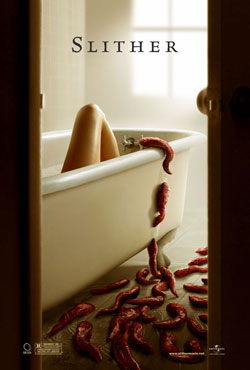 I kind of feel bad for Gregg Henry. The character actor is incredible in Slither – his every line is hilarious, and his delivery is impeccable. He has a fit about Mr. Pibb that left me almost in tears. But I feel bad for him because he was part of a five person press conference at the Slither press day in Los Angeles a couple of weeks back. He had to deal with the overwhelming presence of Michael Rooker, the funny and smart director/writer James Gunn and the press’ interest in talking to stars Nathan Fillion and Elizabeth Banks a whole lot. If you read through this transcript you’ll see that Gregg doesn’t get a lot of words in, which is too bad, since I met him the night before at the premiere party and he was about as nice a guy as you could hope to come across.
I kind of feel bad for Gregg Henry. The character actor is incredible in Slither – his every line is hilarious, and his delivery is impeccable. He has a fit about Mr. Pibb that left me almost in tears. But I feel bad for him because he was part of a five person press conference at the Slither press day in Los Angeles a couple of weeks back. He had to deal with the overwhelming presence of Michael Rooker, the funny and smart director/writer James Gunn and the press’ interest in talking to stars Nathan Fillion and Elizabeth Banks a whole lot. If you read through this transcript you’ll see that Gregg doesn’t get a lot of words in, which is too bad, since I met him the night before at the premiere party and he was about as nice a guy as you could hope to come across.
To be fair, so was everyone else involved in this film. These guys are proud of this movie, and rightfully so – it’s funny, it’s fun, it’s gross, and it has some great scares. And the rapport they have is fantastic – you have to see Gunn and Rooker in action to really get a sense of the playful friendship they have (when they all came into the room Gunn told Rooker there was a chair he could sit on – in the hallway).
I would say that it’s your duty as CHUD readers and people who love good movies to go support Slither when it opens next Friday, but that makes it sound like work. Seeing Slither is a treat, especially for people who like their horror comedies extra gooey (and by the way, I’m going to talk about this more in my review, but for the time being let me assure you that Slither is a horror comedy in the same way Shaun of the Dead is, in that the monster is taken seriously. It’s the people who are funny).
Next week I’ll be bringing you my exclusive one on one with James Gunn; in the meantime I hope you enjoy reading this as much as I did attending the press conference.
Q: James, how much fun was it to sort of create your own set of rules?
Fillion: And then break them.
Gunn: I had to map out the whole biology of the creature, which I did pretty early on – but I still think it’s something that only I understand. [laughter] You guys made me fun of me on the set all the time, beause I’m like ‘No you can’t do that because the guy doesn’t think that because he doesn’t have that knowledge because he’s got this guy’s brain, doesn’t have this guy’s brain, and you don’t know da, da, da, da.’ And you’re like, ‘This only makes sense to you.’
Banks: He gave me an entire exposition line in the car about the disease is conscious or has a consciousness, or has the conscience. And like I couldn’t figure out what the…
Gunn: You said it!
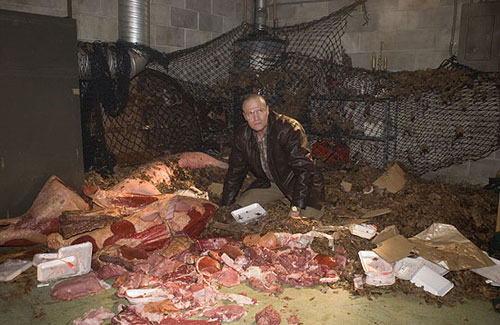
Banks: But it still don’t think it makes any sense to me.
Gunn: I know, every time I see that line I’m going "I should have cut that!"
Banks: The minute she [Tania Saulnier] goes "It’s from up there." I’m like, "That’s good!"
Rooker enters the room.
Rooker: Ok, we can begin now. I have arrived.
Gunn: I like the scene in the car because it’s really funny and it’s like it’s an exposition scene which is actually really fun to watch. Then Nathan says his things about they’re all part of one deal, and I’m like ‘Stop it there. Stop it there. Why do I keep going?’ Then you say that line and you’re so dramatic about it.
Banks: No! I’m like I don’t believe a word I’m saying. I don’t even know what I’m saying!
Gunn: If you’d stop giggling. I mean like, right after she says a line she starts giggling.
Banks: That entire car scene, we were all like, ‘This is getting cut.’
Gunn: That was you!
Banks: ‘It’s not going to be in the movie!’
Gunn: That’s because you didn’t have any funny lines in it! Those guys didn’t want it cut!
Henry: That was great that it didn’t get cut.
Banks: I mean the bathroom stuff with [Nathan’s] mom [I recommend seeing the movie to understand this] and that was all… We improv’d that.
Gunn: Well the beginning part I wrote the night before because my wife who plays Shelby, that role was supposed to be played by a man who backed out on us two days before shooting to go do this TV pilot. My wife fortunately was in town and I’m like ‘Thank God,’ because we’d already shot a bunch of his sides of the conversation with Shelby which is fortunately could be a man or a woman. So I rewrote the scenes to fit my wife, to fit a woman. I rewrote the scenes to fit a woman, and one of the scenes was It’s what you’ve done in there last night that caused a back up. and then he went from there and took his own little thing talking about … trying to explain it away.
Rooker: Well you know that’s true you know. That happens all the time. With the trees and the roots getting in there.
Fillion: To you?
Rooker: You know I’ve had to Roto-Rooter the hell out my pipes. I’ve got a 1927 home and my pipes get stuck all the time.
Gunn: Mine do too after every time you visit me. What are you eating?
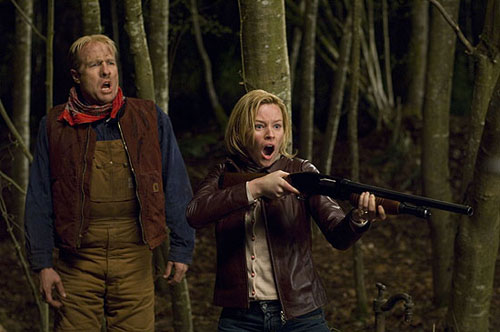
Q: Can you talk about some of the influences that went into this? Because the movie’s obviously packed with references.
Gunn: Yeah, I mean well, the biggest influence, single influence would be Cronenberg, who I grew up with, loving his movies. One of the things I like about Cronenberg is his movies aren’t always scary, but they’re creepy as hell. So I just wanted to bring some of that creepiness back. Then movies like The Fly are actually quite humorous, and the characters are great in the playing. And Jeff Goldblum, I mean I think he deserved an academy award for Brundlefly. So it’s Cronenberg and then all those movies of the eighties: Re-animator, and Basket Case, all Frank Henenlotters films, which I’m a big fan of and I think he’s an undervalued guy. John Carpenter’s The Thing was a huge, huge influence.
Then also in some ways the movies of the thirties and forties, the Universal horror films. Because they were movies in which the monster had a heart and he was in love. There was the Creature from the Black Lagoon, Frankenstein and his Bride, and that’s what Grant Grant is, he’s really in that tradition of Universal horror creatures that are destroyed because they love. Which I think is sort of the message of the movie. If you love you will be destroyed.
Rooker: If you love enough. If you can’t give it up. You know, give up that love buddy, you’ll be fine. You’d be able to take over the world, eat everybody, impregnate everybody and make the other people your slaves. So they’re all dead and gone and you move on to another planet right? But no. No, I’ve gotta love. Jeez!
That was definitely the through line. When I read it I thought "You know what? This is really a wonderful love story. If you know anything about my career, you know this is as close as I’m ever fucking going to get to having a love story.
Fillion: You kiss two girls! Nobody gets to kiss a girl in the movie except for you!
Rooker: I know! I kiss two and I don’t even kill them! Well, I kill one. I don’t really kill her. She splits, right. It’s not my fault.
Gunn: Rooker would come to me with these notes on the page and he’d be like ‘This is beautiful. This is beautiful,’ he says and ‘She gives birth in a manger, just like Mary.’
Rooker: What do you want, that I grew up Baptist, OK? All of the sudden there’s cows and there’s -well they’re dead – but there’s cows and sheep and all these and they’re gutted and everything and I have this image, there’s hay, and wow ,she’s like in a little manger. She’s giving birth you know. She’s giving birth, to the new human race. It was wonderful… Did you get it?
Gunn: Oh yeah, totally. I did. One of the weird things when you talk about how I wrote the script – a lot of the script, I switched back and forth from these guys [Banks, Fillion and Henry] point of view, to seeing it from his [Rooker] point of view. So part of the time during the script I think of him as the hero because to me he’s just doing what he needs to do and you kind of fuck him over. So it’s like… You’re the hardest hearted person.
Henry: Bitch is hardcore.
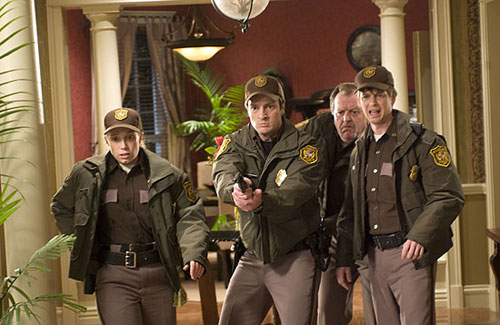
Rooker: She’s a country music song. I mean, it’s always the woman, you know. It’s always her fault.
Gunn: Yeah. If it’s survival of the fittest. You’re the fittest.
Banks: That’s it!
Q: How was getting into make-up every morning and what was like staying in that the entire day?
Rooker: Well I didn’t have to do it every morning. They gave me a break. They really scheduled it quite well, I was very pleased by that. There were some times when I got in about four hours, five hours before any of these other schmucks even cracked an eyelid. You know I’m there literally in the middle of the night. It’s like three AM. You know and I’m coming in there and I sit down and we’re working for five hours before anybody else gets on set.
It could be rough. And you can’t sleep either cause I snore and stuff and Tod Masters (sp) would go like this, he’d just go [lifts his chin up], and I’d go ‘Oh, was I a sleep?’ or I said [pretends he has a mouth full of prosthetic teeth] ‘Auhh ahheep?’ ‘Yeah, you were asleep. Stop talking. You’re going to break the seal.’ But we had varying levels of make-up and some of them weren’t so bad. Taking it off ended up being the worst part. Cause if you go too fast you’ll rip your skin off, and if you go too slow you’re like "Come on! I want to get the hell out of here!"
Gunn: He put up with a lot of pain. I mean the guy is amazing. He’s truly amazing because not too many people would have put up with what he had to put up with. He really deserves props.
Banks: Very impressive professionalism.
Rooker: It was a little bit painful at times, you know but it wasn’t… Well, it was… OK, I mean my neck hurt a little bit.
Gunn: You’ve still got a bump on your shoulder.
Rooker: My shoulder was dislocated because I had to hold the arm back all day long. When I swing the prosthetic arm around, I swung my shoulder out of place. One time I went so hard that I heard ‘crack’ and I broke my shoulder.
Gunn: He worked for another four hours after that, and he never told me until the other night!
Q: So the film is full of really great one liners and really great moments like that that people will be quoting for years. How much of that is improv? How much is in the script?
Fillion: Whatever you liked and thought was the funniest, those were mine.
Gunn: And I wrote them for him.
You know, most of the lines are scripted but there is quite a bit of improv. Then there is quite a bit of stuff that we would do back and forth on set. We would yell lines. Nathan and I did this a lot where we would yell lines back and forth. I’d say, ‘Say this!’ and then he’d say that. In fact when he’s looking at the monster getting attached and he goes ‘That is some fucked up shit,’ you can hear me two seconds before hand saying that because it was something we had thought up. So we would do what was scripted, and then we would kind of throw out a bunch of other ideas. ‘Looks like something that fell off my dick during the war,’ I told that actor to say that like five minutes before we were shooting. He didn’t have a line in the movie either so he was really happy!
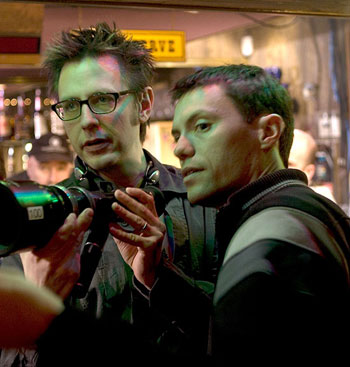
Banks: A lot of it is also that you get there and suddenly you have a visual, you have a situation, you just have a lot more information. You can discover something fun to say.
Gunn: ‘That’s some fucked up shit’ actually came from seeing that tubby guy in there –
Banks: With his ass hanging out!
Gunn: With his ass hanging out, rubbing his body into the [giant goo monster].
Banks: He was the inspiration for the line.
Henry: Almost all of my lines were written.
Rooker: And you have some great lines.
Henry: I have some great lines, and they were all scripted. That was James.
Banks: James Gunn – funny man.
Q: When you watched this with an audience were you surprised by the reactions? Did you think everything worked the way you wanted it to?
Gunn: I was happy with the reactions – I’m always afraid of screenings like last night [the premiere]. We screened the movie last week for horror movie fans in Chicago and it played very well, but it’s always scarier going into a screening like last night because there are a lot of industry people there – and a lot of guys like you folks, frankly – who watch it and enjoy it, but you’re also watching and saying, ‘How is this movie good? How is this movie bad? How am I going to write about this?’ And then you have directors there, who may have something to prove and may not. And then you have a lot of industry people coming, people’s agents and managers and all these people who would probably much rather be seeing Capote. But I was very pleased with the way it played last night.
Rooker: I thought it was great, man. I think we forced you guys to stop thinking about those thoughts and maybe just be grooving on the situation up there on the screen, because I heard a lot of hoots and hollers and screams and laughter. I saw some eye covering.
Fillion: My mom.
Gunn: I got to sit behind Nathan’s mom, and she was hilarious. All I did was watch her the whole time. She was so scared. I was so afraid.
Fillion: Me too! I thought she was going to drop dead from a heart attack. She wasn’t feeling well earlier in the day, she was feeling light headed, so every time something scary was coming up I would squeeze her hand and say, ‘OK, here comes blood. Something’s going to drop down and fall in front of her face.’
And then actually, I got scared. One time I jumped, and I felt like an ass, because it was during one of my scenes.
Rooker: What did you jump at?
Fillion: At the deer. [you have to see it]
Rooker: That’s what I jumped at! You know what it reminds me of? Throw Mama From the Train, where he smacks the guy with the frying pan. I saw it fifty times, I get there, I know it’s coming, and then smack! – and I pee my pants.
Gunn: I am so sick of this movie being compared to Throw Mama From the Train.
Fillion: People laughed at all the right spots. If anything, they laughed over a lot of jokes.
Banks: We lost a lot of laugh lines.
Fillion: But that will bring them back.
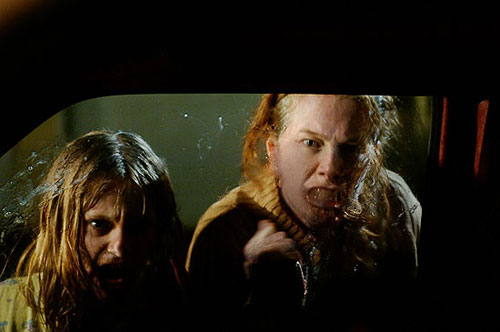
Q: James, how did your experience with Troma affect how you made this movie?
Gunn: Lloyd Kaufman, who is the president of Troma Studios, people think of him as a schlockmeister, but he loves what he does. I think the only thing that’s kept them alive for 30 years now is the fact that he puts his heart into something, and you may hate it, but there are people out there who obviously like what he does, and it keeps him barely able to scrape by because he loves what he does. He taught me a lot about passion and perseverance and how to just keep going for what I want and following what I believe in. I am really grateful to Lloyd.
And Troma gave me a ton of practical – I didn’t go to film school, but I was able to work at Troma and make a movie from pre-production to how to location scout to how to cast to how to release a film in the theater, how to deal with the MPAA, how to do all this stuff. It was a very practical education.
Rooker: And you don’t learn that in school.
Gunn: You learn certain things in school, but a lot of that you don’t. You don’t learn how to deal with the MPAA.
Q: Speaking of that, what was your experience on this film with the MPAA?
Gunn: My experience was very good, because we didn’t have any problems with them. Eli Roth, who’s a great friend and a great guy, gave them Hostel right before we gave them this movie, and I’m eternally grateful to him. If you watch the actual amount of gore, we have more, but because we’re more surreal, we get away with more.
Q: So does that mean there won’t be extra material for the DVD?
Gunn: We have tons and tons of extra material because I tried to cut Rooker out of the film as much as I possibly could. So we have tons of Rooker.
Rooker: I was gonna butt in and say that all my best stuff is on the [deleted scenes]. All my favorite lines that I ended up writing –
Gunn: That didn’t even make it into the extras, my friend!
Q: Elizabeth, out of all the disgusting things you had to put up with in this film, what was the worst?
Banks: Rooker.
Rooker: You set me up for that!
Banks: Honestly, we shot this movie at night, in winter, in Vancouver. It rained all the time and it was freezing, but even still, somehow we were like, ‘This is so much fun!’ Sometimes you look back at a movie and it kind of sucked, but this was so much fun. It was a great environment to work in, so it didn’t matter what was being thrown at me or the KY jelly that was being smeared on me – my main problem, to be honest, is that I had to walk around on that set in bare feet, and the floor was covered in fake glass and blood and splinters. My feet would just be caked with a whole layer of things on the bottom. My feet would just be caked with a whole layer of things on the bottom.
Rooker: That was intentional – that was for your protection.
Banks: It did begin to protect my feet after a while.
Gunn: It just shows you how much it has to do with how pleasant a movie is. You hear people complain about doing movies all the time – well, our movie was extremely physically rigorous, very difficult stuff, and yet it was so pleasant, and it was 100% because of the people. It’s these people here who I got lucky with, but also our crew was awesome. Our crew was so committed. We just got lucky with a huge group of people who were inspired.
Frankly on most movies you have an actor who is a nice guy, who treats everyone on set like a human being. Then the other actors are like, yeah, the director and the producer and the screenwriter are human beings but everybody else is just an object moving around. On this movie we had all of our stars who 100% treated everybody equally. It just created this tremendous amount of energy. I honestly got really lucky.
Rooker: You know what? I think that what it was was that we couldn’t go back to our trailers. So we were forced to be nice to everybody, because we were all in the same muck together.
Gunn: Wait, who else couldn’t go back to their trailer?
Banks: I couldn’t go back.
Fillion: It was too far.
Rooker: It was ten miles away!
Fillion: It also helped that it was freezing and always partly raining, so we were all under these tents with these furnaces blaring, all huddling together for warmth.
Q: James, what’s the last time you tried to guess the speed of a bird?
Gunn: I don’t think I ever did. The last time I did was when I wrote that line and I went on the internet and tried to figure out how fast birds actually go.
Fillion: There’s a Dick Cheney joke in there somewhere.
Q: The paper today talks about the discovery of water on one of Saturn’s moons, and the potential for life there.
Gunn: I love it.
Q: Have you guys thought about life on other planets? Do you think they’re out there?
Gunn: I like this theory where they talk about life being created in water, and that’s where life came from on this planet, but now they’re talking about there was water on Mars many millions of years ago, and that probably, if life is created in water, life was initially created on Mars. Which could have gotten stuck to a meteor that ended up here, so in fact, life began on Mars and came to Earth, so we are in effect all Martians. And I love that, because when I was a kid I used to draw Martians all the time. I love the fact that I might be a Martian.
Rooker: Are Martians aliens?
Banks: All Martians are aliens, not all aliens are Martians.
Gunn: Jack MacReady [Gregg Henry’s character] is wrong! It’s not a general term.
Banks: I have no idea. I’m open to it. Sure.
Fillion: I say, yeah, for real. It’s out there. The odds of it not happening –
Banks: That goes for me. I love science and the odds are sure.
Henry: Something’s out there. Whether it’s been here yet, I don’t know.
Rooker: My cousin Earl is a Martian. My cousin Earl, he’s an alien. He truly is. He’s got the accent to prove it, and he has a raygun. He does have a raygun. He carries it with him.
Gunn: Rooker, you’re crazy.
Rooker: When I get those kinds of questions, I reverse the question with a question. What do you think, sir. That’s my only way of getting out of those ones.
Q: Nathan, you’re doing White Noise 2. The first one was a real surprise hit – how are they going to recapture that?
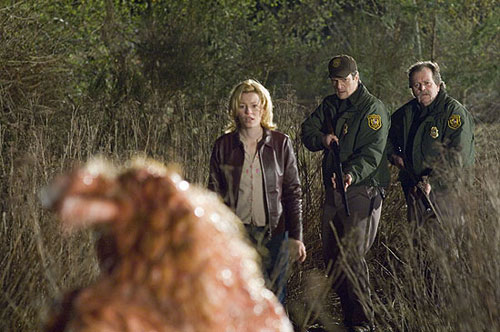
Banks: Well they’re going to have Nathan.
Fillion: Yeah, they have me. You know, I go to work every day and I say, ‘How do I save this movie?’ With White Noise 2, I’m saying, ‘Guys – the name. Let’s go with Whiter Noise. Let’s go with White Noisier. Still White Noise After All These Years.’
What was the question?
Rooker: How are you saving the movie?
Fillion: Here’s the idea – the first movie we were trying to receive messages through detuned televisions from beyond the grave. In this movie I have a near death experience and it allows me to be the detuned receiver. I can see now the white noise. I don’t need a receiver of any kind, and I can see it, but nobody else can. So now I’m all crazy!
Q: So no radios or snowy TVs.
Fillion: It’s there – but I’m the only one who sees it!
Rooker: Nathan Fillion is the transmitter.
Banks: It’s still every day objects.
Fillion: It’s still the same thing but I’m the only one seeing it and everybody else is going, ‘Cuckoo!’ Which adds for tension. Tension. Tension. Drama. Tension.
Gunn: You’re going to do well on Mr. Mom 2 as well. Night Shift 2.
Q: Nathan, you told us last year that one of the difference between your character in Serenity and your character in Slither is that Bill Pardy is totally unprepared for what’s going on once the aliens attack. Which type of hero is more fun for you?
Fillion: Malcolm Reynolds is the type of hero who didn’t want to be a hero – he refused that role but was thrust into it. But Malcolm Reynolds had seen enough and experienced enough stuff that he could handle it. Bill Pardy I don’t think could handle regular police work, never mind these extreme circumstances. He’s not only irresponsible and a little lazy and ill-prepared, he’s… he’s calm, he’s a calm guy, he’s trying to think, he’s trying to hold on, and he’s doing it in front of the girl he has a big crush on. He’s trying to do it in front of the girl and it just doesn’t happen for him. He’s not the cool guy. That’s what I love about him. He’s a real person.
Gunn: Bill has dealt with a life where the bar has been extremely low for him. Suddenly the bar is lifted much higher. I mean, he’s excelled –he’s the chief of police. But that’s just because everyone around him is worse.
Banks: I mean, the chief of police of Wheelsey ain’t saying much.
Q: Elizabeth – Spider-Man 3, Betty Brant, are you back?
Banks: Yup!
Q: Do you have a bigger part this time?
Banks: You know, I learned my lesson a long time ago that everything can be cut. So I don’t know.
Q: Were you aware that Betty was Peter’s first girlfriend?
Banks: I am well aware. You should maybe write Sam Raimi a letter and make him aware.
Gunn: Tell them how you become Venom.
Banks: Exactly.
Gunn: What, was I not supposed to say that?
Banks: Start spreading the rumors, kids!
Q: We know what some of James Gunn’s favorite horror films are, but what about everybody else?
Fillion: Jaws changed my life. I can’t go into a pool by myself and be comfortable. It’s ridiculous. I look for reasons to hate sharks.
Banks: For me it was Poltergeist and clowns. And under the bed – anything under the bed. I hate anything under my bed.
Gunn: The director of Poltergeist was there last night. Did you know that?
Banks: No. Oh I would have loved to talk to him.
That and Alien, for the female ass-kicking.
Henry: I’m a big Carrie fan. The end of that movie gets me every time.
Rooker: I don’t go to these things. I’m more of a musical guy. I like musical. I don’t have any favorite horror movies at all. I remember a lot because they would drop me off at the theater and make me watch them and not pick me up until it was over, so I was forced to watch as a child and it affected me in some other weird ways, I don’t know. But no, they’re scary to me, I can’t deal with them. I like Climb Every Mountain kinds of things.
Gunn: Rooker, no one in this room knows if you’re being serious. Not a single – I know you, I talk to you every day, I have no idea what you’re talking about.
Banks: I think he’s saying he loves the Sound of Music. I think that’s all he’s saying.
Gunn: My actual favorite horror film is Rosemary’s Baby.
Q: Slither 2?
Henry: I’d prefer a prequel.